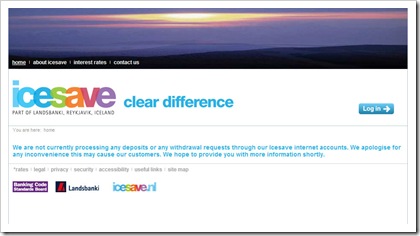Iceland refuses fund withdraws from non-Icelandic accounts and is on the verge of collapse.
 Iceland, which won the UN's 2007 "best country to live in poll" and which previously held the world's highest per capita wealth , might be on the brink of bankruptcy and collapse. Inflation and interest rates are raging upwards. The krona, Iceland's currency, is in freefall and is rated just above those of Zimbabwe and Turkmenistan. During the housing boom, Iceland's banks took on massive foreign debts as they expanded overseas. Iceland overextended themselves by lending more than they should have, and in foreign currencies.
Iceland, which won the UN's 2007 "best country to live in poll" and which previously held the world's highest per capita wealth , might be on the brink of bankruptcy and collapse. Inflation and interest rates are raging upwards. The krona, Iceland's currency, is in freefall and is rated just above those of Zimbabwe and Turkmenistan. During the housing boom, Iceland's banks took on massive foreign debts as they expanded overseas. Iceland overextended themselves by lending more than they should have, and in foreign currencies.
Last week, one of the country's three independent banks, Glitnir Bank, was nationalized, another, Landsbankinn, was asking customers for money, and the discredited government and officials from the central bank have been huddled behind closed doors for three days with still no sign of a plan. International banks won't send any more money and supplies of foreign currency are running out.
On Friday the lines at the banks were huge, as people moved saving into the most secure accounts. Yesterday people were buying up supplies of olive oil and pasta after a supermarket spokesman announced on Friday night that they had no means of paying the foreign currency advances needed to import more foodstuffs.
On Monday, the government ordered a halt in trading in all of the island's banks before the stock exchange opened. Also on Monday, the krona shed some 30 percent on the day to a record low close against the euro. Currently as of writing, the exchange rate for krona and dollars is USD$1 = 0.009321 kronas. In the wake of this, inflation in the country, which is heavily dependent on imports, is set to rocket.
Today October 7th Icelandic Prime Minister Geir Haarde threatened with national bankruptcy, guaranteed domestic bank deposits and gave regulators the power to take over bank assets and obtain funds from lenders that may become "inoperable." "It is every country for itself," Haarde told a press conference in Reykjavik, after failing to secure funds from abroad for a broader bailout of the system. "We want to save what can be saved."
A bill presented to parliament authorizes the financial supervisory authority to take control of commercial banks' assets and appoint boards, Haarde said. It also allows the state-backed Housing Financing Fund to take over banks' mortgage operations. By doing this, the government takes over housing loans held by the banks and puts them into a government housing fund, in an effort to help thousands of islanders who face the loss of their homes.
"I would like to defuse all doubts that deposits by Icelanders and private pension savings in all Icelandic banks are not secrure," Haarde said. "No-one need be in any doubt about that." He didn't mention deposits held at Icelandic banks' foreign subsidiaries.
According to Standard & Poor's, Haarde's comments implied that depositors and creditors at foreign units of Icelandic banks "must rely on the financial resources of the overseas subsidiaries themselves."
"The interests of the nation are greater than the interests of the individual banks," Haarde said. "We in the government are only acting with the interests of the nation in mind, even if it means that harsh measures have to be taken against those with a vested interest. When a situation like this comes up the shareholders suffer damage, in this situation it is to be expected that some lenders' claims will not be met."
Haarde also stated, "We were faced with the real possibility that the national economy would be sucked into the global banking swell and end in national bankrputcy."
His government aims to ensure that deposits at Kaupthing Bank hf and Landsbanki Island hf are protected from bank debts that have spiraled to about 12 times the size of the island's economy. "It is too risky for the Icelandic nation as a whole to secure a lifeline for the banks," Haarde said. "The danger is real that the Icelandic economy would be sucked, along with the banks, under the waves and the nation would become bankrupt."
The government last week took a 75 percent stake in Glitnir Bank after the third-biggest lender failed to secure funding.
On Tuesday, Iceland's market authority said it would take control of Landsbankinn. "Based on new legislation, the Icelandic Financial Supervisory Authority (IFSA) proceeds to take control of Landsbankinn to ensure continued commercial bank operations in Iceland," the authority said in a statement.
Landsbankinn owns an Internet savings bank called "Icesave". British savers have been blocked from withdrawing funds from Icesave, after Iceland's financial regulator took control of the country's second largest bank yet the Netherlands Icesave webpage states nothing of the sort. The Icelandic government has dismissed the bank's board and put the institution into receivership. Confirmation on the move came from Iceland's banking minister this morning, as the Icesave bank, controlled by Landsbanki, said that 300,000 British savers with the bank would not be allowed to withdraw their money. The banking minister also confirmed that the bank where British savers have £4.5 billion of funds (USD$7.8 billion), would be taken over by the Icelandic Financial Supervisory Authority (IFSA), according to the emergency banking legislation that was passed last night. "Domestic deposits are fully guaranteed, as declared by the government. Landsbanki's domestic branches, call centers, cash machines and internet operations will be open for business as usual." According to the Icelandic central bank, Russia would provide a loan of 4 billion euros ($5.44 billion) to finance the collapsing bank. The suspension of non-Icelandic accounts will remain in place until further notice.
Kaupthing Bank, which operatives in 13 countries, foreign assets make up about 90 percent of its holdings, while the central bank's foreign reserves were 308 billion krona in August, making any bailout hard to finance. Something interesting to note about Kaupthing Bank, is that in 2000 they began operations in the US under the name of Kaupthing New York Inc. The company website states "The company focuses on securities brokerage. Brokerage of shares and bonds takes place through the subsidiary of Kaupthing Securities." They stated today, October 7, that they have not been approached by authorities over any intervention, adding it had received a 500 million euro ($679.5 million) from the central bank.
Outside of Reykjavik's Hofdahollin car showroom, looking a little rumpled for men trying to sell new and used cars for £35,000 (US $60,800+) and up, owner Runar Olafsson and his top salesman are sharing a Marlboro. They are not expecting any customers today. "A few years ago we couldn't get enough top-end cars and we started importing them. We were selling 120, 140 a month. But it turned around so fast," says Olafsson. "It's so dramatic, just in one month. We have already seen two dealers go down."
"Customers would come in and we would apply for credit online for them, a 100 percent loan, and they can drive away in their new Range Rover. It took ten minutes, it was easy. But 60 to 70 percent of those loans were in foreign currency, Japanese yen or Swiss francs, and they have gone up 90 percent as the krona burns. A car worth 5 million krona (USD$46,607) now has a 9 million (USD$83,892) loan on it; how are people going to make those payments?"
Foreign currency loans are a problem for homeowners, too. "Loans have been very cheap, house prices rose and there was a lot of good-quality homebuilding. But the building has halted, nothing is being finished, nothing is selling. The interest rates are staggering. What people are doing right now is swapping houses if they want to go bigger or smaller. That is what is keeping us afloat," says real estate agent Ingolfur Gissurarson.
SOURCES:


0 Responses to "Iceland refuses fund withdraws from non-Icelandic accounts and is on the verge of collapse."
Post a Comment